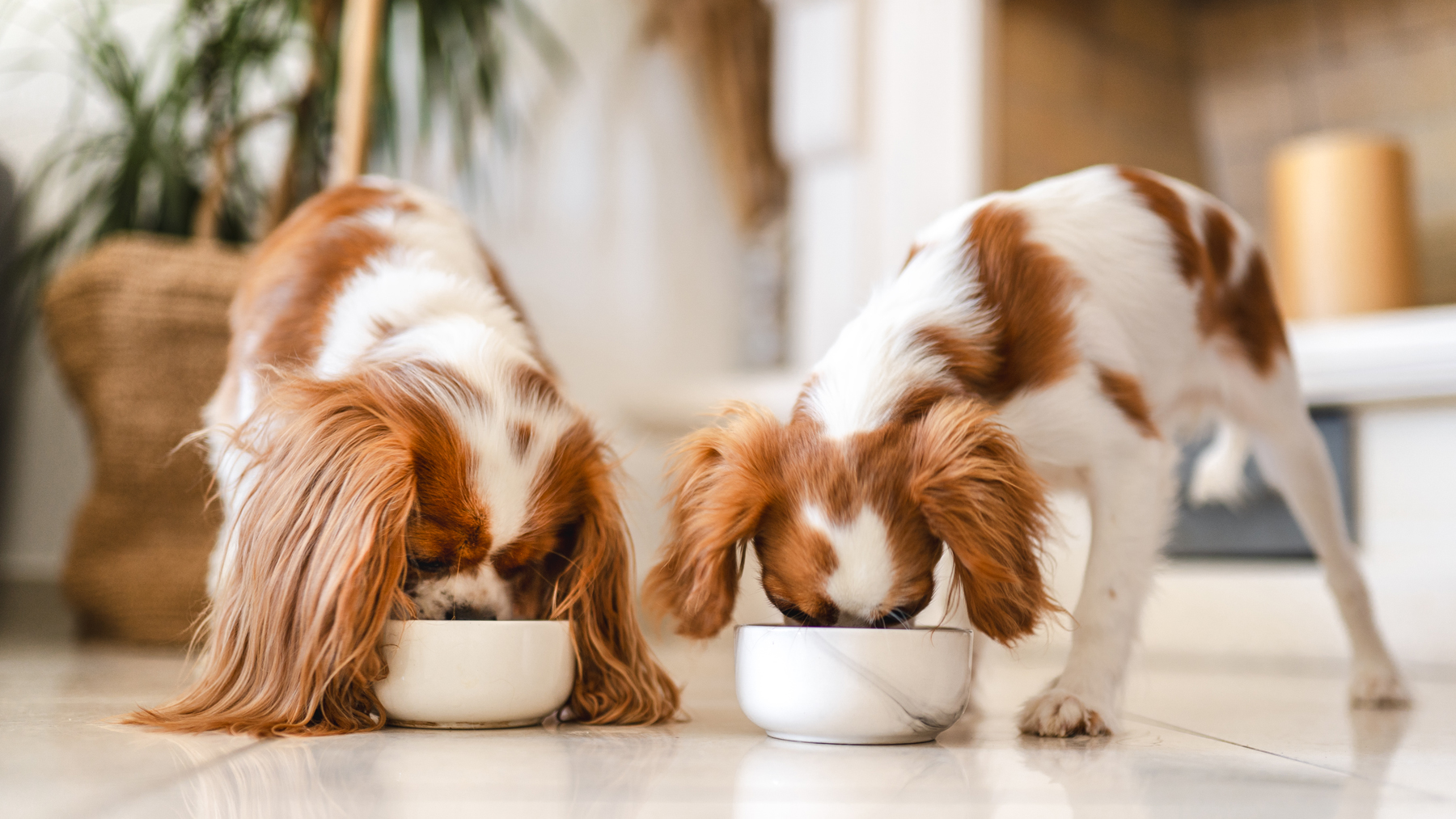How to improve dog gut health
Follow these simple ways to improve your dog’s gut health to boost their emotional and physical wellbeing

If you are curious about how to improve dog gut health then you may have heard the term ‘gut microbiome’. Over recent years, the gut microbiome has been getting a lot of attention in the human world - but it’s time to understand how relevant a topic it is when discussing our dog’s wellbeing too.
Whether you’re feeding the best raw dog food, cooked or dry kibble, you’ll no doubt want your dog’s health to be at an optimum. As the gut microbiome is responsible for not only how our dogs can process their food but how they’re also feeling, it’s a pretty important topic to talk about.
As a behaviorist, I want to ensure a dog’s whole well-being is considered when we’re trying to address any emotional challenges that they may be experiencing. With the stomach being known as ‘the second brain’ - being key to our dog’s mood state - we’d be amiss to ignore signs that a dog’s gut microbiome might be out of whack.
What Is the gut microbiome?
According to the Department of Small Animal Clinical Sciences, the gut microbiome is composed of bacteria, archaea, viruses, and eukaryotic organisms that reside in the gastrointestinal tract. Just like in humans, the gut microbiome plays a pivotal role in maintaining a dog's overall health and well-being.
The microbiome has a big job to do - aiding in digestion and how well our dogs are able to absorb certain nutrients, regulating the immune system, and even influencing our dogs’ behavior and mood through the gut-brain axis.
The composition of a dog's gut microbiome can be influenced by numerous factors, including diet, genetics, age, and environment. There can even be an impact based on who else the dog lives with.
Signs of poor gut health in dogs
Poor gut health can impact many areas of your dog’s physical and emotional well-being. It’s important to know what signs to look out for so you can intervene early to prevent chronic disease or emotional decline.
Get the best advice, tips and top tech for your beloved Pets
Common Signs
Some of the more obvious and common signs that your dog’s gut needs some attention include:
- Diarrhea or sickness
- Reduced appetite and weight loss
- Blood in their stool
- Constipation
- Wind
Allergies
It’s also important to look at the gut when you see any allergic responses in your dog as an impacted microbiome can cause conditions such as:
- Itching
- Dry and Flakey Skin
- Hot Spots
- Paw Chewing
- Inflammation
Behavior Challenges
And of course, we also want to look at how our dog is feeling emotionally. With the gut being heavily responsible for the overall mood state, it is likely that a dog who suffers from behavioral challenges, such as fears, anxiety, or aggression, may have an impacted microbiome. According to a 2019 study published in the Zoological Science journal, findings indicate that gut microorganisms are linked to dog aggression and point to an aggression-associated physiological state that interacts with the gut microbiome.
What can harm a dog’s gut health?
According to the Department of Small Animal Clinical Sciences, “GI dysfunctions are the most obvious association with gut dysbiosis. In dogs, intestinal inflammation, whether chronic or acute, is associated with significant differences in the composition of the intestinal microbiota.”
Stress affects the physiological and stress system and can also impact gut microbiota.
Dogs who are born into less than desirable conditions can have an impacted gut microbiome, due to being restricted from contact with other dogs and people, alongside being fed a restricted diet.
Recent antibiotic use can have a huge impact on gut health, as these treatments not only strip the bacteria it's targeting but a number of other microorganisms too.
Diet is also an important factor to note whenever we’re discussing gut health. What your dog eats on a daily basis can influence the abundance of bacteria in the gut.

Ways to improve your dog’s gut health
Test
There are a number of options when it comes to testing to see how healthy your dog’s gut is. Most commonly, a stool sample will be used to test for the presence of bacteria in the gut. This allows you to see what phyla of bacteria your dog may be missing in their gut so you can make some dietary changes or introduce supplements to support this depletion.
Pro/Pre/ and Post-biotics
If your dog’s microbiome needs a bit of a boost, then looking at pro/pre/and post-biotics is a good place to start. These can be fed through supplements such as from soil-based bacteria which can survive the digestive process more easily. You can also feed fermented vegetables such as sauerkraut. This feature on prebiotics and probiotics for dogs has everything you need to know.
Digestive Enzymes
If your dog is struggling with processing certain nutrients, digestive enzymes can help break down food molecules into smaller pieces for easier digestion. Look for supplements that include the main types of enzymes that your dog will require: Protease, Amylase, Lipase, and Cellulase. There are also some natural whole foods such as mangoes and papayas that are also enzyme-rich.
Support your dog during and after antibiotic use
If your dog needs to take antibiotics under veterinary advice, you’ll want to ensure that you help replenish their microbiome using probiotics during and after treatment. It can also be useful to test your dog's gut health again following any period of antibiotics to see what impact they may have had.
Diet
Feeding a variety of foods, especially different fibers, can positively impact the richness of the gut microbiome. Non-starchy, fibrous vegetables with a focus on leafy greens are especially helpful. Try to avoid feeding a highly processed diet that is nutritionally depleted, aiming for a lightly cooked or raw meal. Older dogs or those recovering from illness, can sometimes benefit from lightly cooked food to help them digest their meal more easily.
In the human diet world, we’ve moved away from the old ‘five a day’ saying towards a goal of eating 30 different plants per week. This is a great guide for how you feed your dog as well.
Reduce stress
As stress can cause both inflammation and have an impact on the health of your dog’s gut, it’s important to try and support your dog to feel as calm and relaxed as possible. Avoid triggers that will upset your dog and work with a canine behaviorist on the best ways to create new positive emotional responses in the future.
When it comes to our dog’s overall wellbeing - both physical and emotional - it’s important to look beneath the surface. While it’s easier to spot an obvious limp or cut on a dog’s body than it is to know what’s going on in their gut, please don’t underestimate the importance of their gut health on our dog’s longevity and enjoyment of life.

Caroline Wilkinson is a Certified Animal Behaviorist. She is a Full (assessed) Member of the Association of Professional Dog Trainersand INTODogs – as well as a Registered Training Instructor (ABTC). Caroline is also a Certified Real Dog Yoga Practitioner and an Applied Canine Zoopharmacognosist.
As the founder of digital pet coaching service Barket Place, Caroline has a passion for improving connections between human and hound, with a focus on relationships and reduction of stress for canines living in a human world. She helps pet parents, like you, to work through challenges they may be experiencing with their dog's behavior, so that they can get back to the important job of loving their dog.
Caroline writes for Edition Dog Magazine, as well as a number of trusted pet brands. She also speaks around the country – presenting workshops and webinars with a focus on living more mindfully alongside our canine companions. She is also the co-host of chart-topping podcast, ‘Supporting Both Ends of the Lead’ and has spoken about dangerous dogs on BBC Points West and BBC Radio Bristol.
